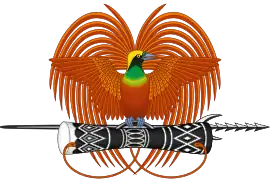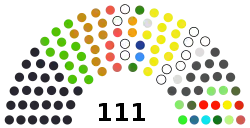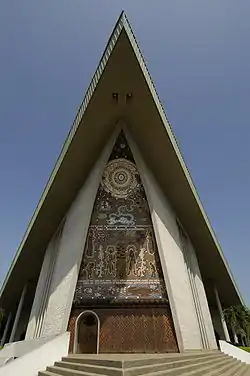National Parliament of Papua New Guinea
The National Parliament of Papua New Guinea is the unicameral national legislature in Papua New Guinea. It was created in 1964 as the House of Assembly of Papua and New Guinea but gained its current name after the nation was granted independence in 1975.
National Parliament of Papua New Guinea | |
|---|---|
| 10th Parliament | |
 | |
| Type | |
| Type | |
Term limits | 5 years |
| History | |
| Founded | 1964 |
| Leadership | |
Elizabeth II since 16 September 1975 | |
Bob Dadae since 28 February 2017 | |
Job Pomat since 2 August 2017 | |
| Structure | |
| Seats | 111 (89 open electorates and 22 provincial electorates) |
 | |
Political groups | Government
Opposition
Crossbench
|
| Elections | |
| Instant-runoff voting | |
Last election | 24 June 2017 - 8 July 2017 |
| Meeting place | |
 | |
| National Parliament House, Port Moresby | |
| Website | |
| www | |
 |
|---|
| This article is part of a series on the politics and government of Papua New Guinea |
The 111 members of parliament serve five-year terms, 89 of whom are chosen from single-member "open" electorates, which are sometimes referred to as "seats" but are officially known as constituencies. The remaining 22 are chosen from single-member provincial electorates: the 20 provinces, the autonomous province of Bougainville (North Solomons), and the National Capital District. Each provincial member becomes governor of their province unless they take a ministerial position, in which case the governorship passes to an open member of the province.[1]
From 1964 until 1977 an Optional Preferential Voting System was used. The first past the post system was used from 1977 until 2002. Electoral reforms introduced by former Prime Minister Mekere Morauta introduced Limited Preferential Voting, in which voters numbered three preferred candidates. LPV was first used nationally in the 2007 election.[2]
As in other Commonwealth realms, the party or coalition with the most seats in the parliament is invited by the Governor-General to form a government, and its leader subsequently becomes Prime Minister of Papua New Guinea. The Prime Minister then appoints his cabinet from fellow parliament members. Members of parliament are seated in a similar manner to other Westminster system parliaments, but use chairs instead of benches.
Papua New Guinea has a fractious political culture, and no party in the history of parliament has yet won a majority.[1] Therefore, negotiations between parties have always been necessary to form governments. New governments are protected from votes of no confidence during their first 18 months and during the last 12 months before a national election. More recently, in a move aimed at further minimizing no-confidence motions, then-Prime Minister Mekere Morauta introduced changes that prevented members of the government from voting in favour of such a motion.
All citizens over the age of 18 may vote, although voting is not compulsory.[3]
Latest election
| Party | First preference votes | % | Seats | +/– |
|---|---|---|---|---|
| People's National Congress Party | 1,039,940 | 13.16 | 28 | |
| National Alliance Party | 484,300 | 6.13 | 15 | |
| Triumph Heritage Empowerment Rural Party | 323,951 | 4.10 | 4 | |
| Pangu Party | 322,049 | 4.08 | 9 | |
| United Resources Party | 310,282 | 3.93 | 10 | |
| People's Progress Party | 273,839 | 3.46 | 5 | |
| Papua New Guinea Party | 216,527 | 2.74 | 5 | |
| PNG National Party | 186,279 | 2.36 | 3 | |
| People's Party | 138,395 | 1.75 | 2 | |
| Social Democratic Party | 129,266 | 1.64 | 2 | |
| People's Labour Party | 127,989 | 1.62 | 2 | |
| Grassroots United Front Party | 124,223 | 1.57 | 0 | |
| United Party | 111,786 | 1.41 | 1 | |
| PNG One Nation Party | 103,515 | 1.31 | 1 | |
| Christian Democratic Party | 100,731 | 1.27 | 1 | |
| People's Democratic Movement | 100,547 | 1.27 | 1 | |
| Coalition for Reform Party | 99,011 | 1.25 | 1 | |
| People's Movement for Change Party | 74,747 | 0.95 | 1 | |
| People's Action Party | 70,365 | 0.89 | 0 | |
| Trust PNG Party | 66,513 | 0.84 | 0 | |
| New Generation Party | 65,662 | 0.83 | 0 | |
| Melanesian Alliance Party | 63,737 | 0.81 | 1 | |
| PNG Country Party | 53,823 | 0.68 | 1 | |
| Model Nation Party | 49,641 | 0.63 | 0 | |
| PNG Youths Party | 41,017 | 0.52 | 0 | |
| Our Development Party | 35,186 | 0.45 | 1 | |
| PNG Socialist Party | 34,791 | 0.44 | 0 | |
| PNG Constitutional Democratic Party | 28,702 | 0.36 | 0 | |
| Papua New Guinea First Party | 28,323 | 0.36 | 0 | |
| Paradise Kingdom Party | 23,239 | 0.29 | 0 | |
| SOM Pioneer Party | 22,813 | 0.29 | 0 | |
| Nation's Interest Party | 20,419 | 0.26 | 0 | |
| Melanesian Liberal Party | 16,429 | 0.21 | 1 | |
| People’s Freedom Party | 14,436 | 0.18 | 0 | |
| PNG Destiny Party | 7,495 | 0.09 | 0 | |
| PNG Greens Party | 7,291 | 0.09 | 0 | |
| Stars Alliance Party | 6,502 | 0.08 | 0 | |
| Mapai Levites Party | 6,385 | 0.08 | 0 | |
| National Conservative Party | 2,773 | 0.04 | 0 | |
| Wantok In Godly Services Party | 2,435 | 0.03 | 0 | |
| People’s Resources Awareness Party | 496 | 0.01 | 0 | |
| Republican Party | 101 | 0.00 | 0 | |
| Independents | 2,967,067 | 37.54 | 14 | |
| Unavailable[lower-alpha 1] | – | – | 2 | – |
| Invalid/blank votes | 145,760 | – | – | – |
| Total | 8,048,778 | 100 | 111 | 0 |
| Registered voters/turnout | – | – | ||
| Source: Development Policy Centre | ||||
See also
- Women in the National Parliament of Papua New Guinea
- Elections in Papua New Guinea
- List of Speakers of the National Parliament of Papua New Guinea
- Members of the National Parliament of Papua New Guinea, 2002–2007
- Members of the National Parliament of Papua New Guinea, 2007–2012
- Members of the National Parliament of Papua New Guinea, 2012–2017
- Members of the National Parliament of Papua New Guinea, 2017–2022
- List of legislatures by country
- Politics of Papua New Guinea
Notes
- These results omit the figures for Central Bougainville (where a recount took place) and Henganofi
References
- "About Our Parliament". National Parliament of Papua New Guinea.
- "Papua New Guinea National Elections 2012: Final Report". Commonwealth of Nations. 13 September 2012. Retrieved 19 May 2015.
- "Enrolment Awareness". Electoral Commission of Papua New Guinea.
External links
| Wikimedia Commons has media related to National Parliament of Papua New Guinea. |